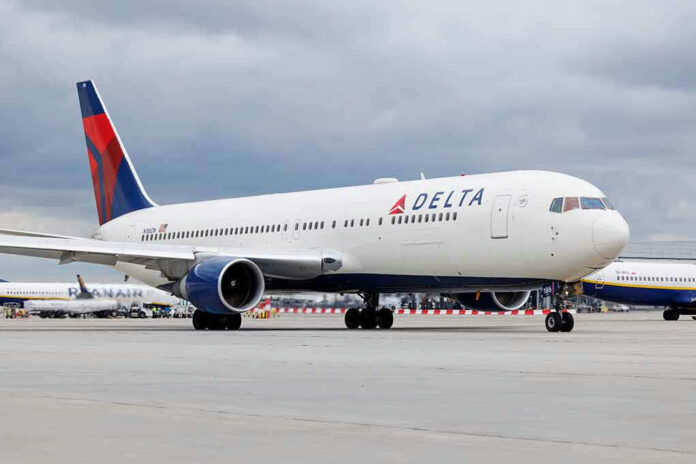
Delta Air Lines removed a double-amputee Marine veteran from an exit row seat, raising national outrage over the erosion of common sense and respect for American heroes under rigid, bureaucratic airline policies.
Story Snapshot
- A decorated Marine veteran and police officer with prosthetic legs was forced out of an exit row seat by Delta staff due to his disability, despite his proven capability.
- The incident led to a high-profile lawsuit, spotlighting discrimination against veterans and disabled Americans.
- Federal regulations are being inconsistently applied, undermining personal liberty and common sense in the name of “safety.”
- The case amplifies concerns about unchecked corporate power and the need for policies that honor service and individual rights.
Veteran’s Service and Skills Ignored by Airline Bureaucracy
Marine veteran Matias Ferreira, who lost both legs in Afghanistan and now serves as a police officer, was removed from an exit row seat by Delta crew in 2025. Ferreira, who uses prosthetic legs and has an impeccable record in physically demanding roles, was told his disability made him ineligible for the seat, despite his insistence that he could perform any required emergency duties. This removal occurred even though Ferreira routinely books exit row seats for additional comfort and has previously flown in such seats without incident.
Marine vet with prosthetic legs was kicked out of exit row seat by Delta crew: lawsuit – New York Post https://t.co/TQTOb1C6J8
— Stevenyodude (@stevenyodude) November 11, 2025
Ferreira’s forced relocation to a cramped middle seat was not only humiliating but also sparked a lawsuit against Delta Air Lines. The veteran highlighted that the crew’s decision contradicted both his lived experience and the intent of federal regulations, which are meant to assess capability, not simply exclude those with prosthetics. The crew’s rigid reading of policy ignored Ferreira’s proven fitness and history of service, raising questions about whether airline staff are empowered to exercise common sense—or merely enforce blanket rules without regard for individual merit.
How Federal Rules Enable Discrimination Against Capable Americans
Federal Aviation Administration (FAA) guidelines require exit row occupants to be “able-bodied” and capable of assisting in emergencies, but these rules are interpreted variably by airlines. While the intention is safety, in practice, policies often default to visual cues rather than actual ability. Disabled veterans like Ferreira, who exceed many physical standards, are too often caught in this bureaucratic dragnet. Airlines, eager to avoid regulatory risk, sometimes apply these rules in ways that erode fundamental fairness and personal liberty—key values for American conservatives who demand government and corporate restraint.
Ferreira’s case is not isolated. Other veterans and disabled passengers have faced similar treatment, from being denied preferred seating to being asked to remove advocacy clothing. These incidents reveal a troubling pattern: regulations and corporate policies, when applied without discretion, can trample the dignity and rights of service members and law-abiding citizens. The failure to individually assess ability reflects a broader societal drift toward one-size-fits-all mandates that ignore personal responsibility and common sense.
Public Backlash and Calls for Policy Reform
The lawsuit and ensuing media coverage have ignited widespread criticism of Delta and its policies. Veteran advocacy groups and disability rights organizations have rallied behind Ferreira, demanding that airlines adopt individualized assessments and respect the proven capabilities of disabled passengers—especially those who have served their country. The current public debate underscores a fundamental conservative concern: that America’s heroes are being sidelined by risk-averse corporations and unaccountable bureaucrats, eroding respect for service and individual merit.
While Delta has not issued a detailed response, the silence is telling. The incident has become a litmus test for whether American institutions—public and private—will defend or betray the values of liberty, merit, and respect for those who have sacrificed for the nation. The outcome of Ferreira’s lawsuit could set a legal precedent, forcing airlines to reconsider their approach and reaffirm the foundational principle that Americans are judged by their abilities, not by government-mandated checklists or visible disabilities.
The broader impact may extend beyond Delta, prompting airlines across the country to rethink staff training and eligibility criteria. As public pressure mounts, the case stands as a rallying cry against the unchecked expansion of corporate and regulatory power at the expense of individual rights—a central concern for conservative Americans determined to restore constitutional balance and common sense in everyday life.
Sources:
Marine vet with prosthetic legs kicked out of exit row seat by Delta crew: lawsuit












